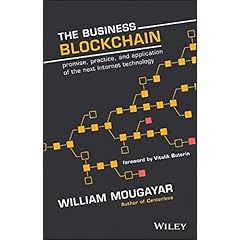 |
| Amazon link |
I was enrolled into the Amazon Vine programme back in 2008 (Amazon post a list of stuff they want reviewed tailored to your interests, you choose an item, they send it to you for free, you review it). In the old days there was a monthly email but that, for some reason, got discontinued. I assumed the Vine scheme had lapsed.
Still, you continue to get personal kudos, even on reviews for products you paid good money for.
But Vine is not dead - you merely have to hunt a bit for the obscured product page. Most of my items there seemed bizarre: Mills and Boon style romances, children's books, iPhone covers .. but there was one which looked tolerably interesting and I selected it, half-thinking to test whether Vine was still working for me.
"The Business Blockchain: Promise, Practice, and Application of the Next Internet Technology" by William Mougayar (Author), Vitalik Buterin (Foreword), arrived yesterday afternoon.
Vitalik Buterin is a 22 year old wunderkind and a founder of Bitcoin and Ethereum.
Ethereum? I knew I had heard something about that recently. I vaguely recalled it was 'bitcoin on steroids', a blockchain with added scripting language which had been hacked! Since the code was meant to be authoritative, no-one knew what to do about that at the time.
Synchronicity. SSC pointed to this breathless tech-journalism and I was transported back to the land of Neal Stephenson: 'Snow Crash' and 'Cryptonomicon'.
"It’s 4am and I’m sitting in a hotel room in Shanghai, China. The second ever Ethereum developers conference is set to kick off in a few hours. The time-zone shift woke me up early, and I’m sitting in my bed playing with my newly modded phone. The Chinese government censors most large American mobile apps behind something colloquially referred to as “The Great Firewall” so you need to use all of these shoddily made, Chinese government approved, replacement apps instead.And so it continues.
"The preferred app for messaging is an app called WeChat, a bizarre Slack / Venmo / Tinder hybrid that 800 million people use to communicate every day. We have a group chatroom for the conference going, which I’m scrolling through when my phone buzzes. Someone posted a new message. “The Ethereum network is under attack”.
"Ethereum is this insane thing going on in the tech world right now. It’s a new cryptocurrency that is picking up the pieces of the fractured Bitcoin ecosystem and trying to succeed in accomplishing what Bitcoin has failed to do, deliver the first batch of successful consumer applications built on top of blockchain technology. You can think of Bitcoin a bit like a shared google doc spreadsheet that anyone in the world can send data to, one global ledger of accounts and balances. Ethereum builds on this idea by providing a mechanism for users to add custom formulas into the cells.
"Anyone who has done any kind of Microsoft Excel programming knows how powerful spreadsheets can become with just a few simple formulas. Ethereum is the first working implementation of programmable money, a simple concept that may one day bring the entire global financial system to it’s knees. And it draws brilliant people from all walks of life into its orbit.
The 4AM attack on the network is bizarre in that it’s not really a malicious hack, but more like comical mischief. Ethereum runs as a distributed system. At any given time, there will be thousands of separate computers (also called nodes) running the Ethereum protocol and keeping the network online. The actual software that the computers use to run the Ethereum protocol comes in many different flavors, the most popular one is an application called Geth, written in Google’s Go programming language. 85% of all Ethereum nodes are running Geth at the time.
"The attack pushes a piece of data onto the blockchain that exploits a bug in the Geth software causing the program to crash. Because every live node syncs the latest version of the blockchain in real-time, just like that 85% of the Ethereum network goes offline. Some developers are able to respond by switching over to the Parity Ethereum client, a new client written in the high-performant Rust Language that is currently gaining market share, but for others switching over to Parity is too risky without having time to run extensive testing. The Ethereum network is essentially frozen until an update can be pushed to Geth.
"The main developers of Geth are asleep in Shanghai. They might not even have their laptops with them, as it’s risky to take your work computer into mainland China if it contains any sensitive information. They’re also scheduled to go on stage and give a presentation in a couple hours. When they wake up, do they fix the bug and miss their talk or go onto the stage? Like I said, comical mischief."
I can hardly wait. My review should be up in a week or so.
More.

No comments:
Post a Comment
Comments are moderated. Keep it polite and no gratuitous links to your business website - we're not a billboard here.